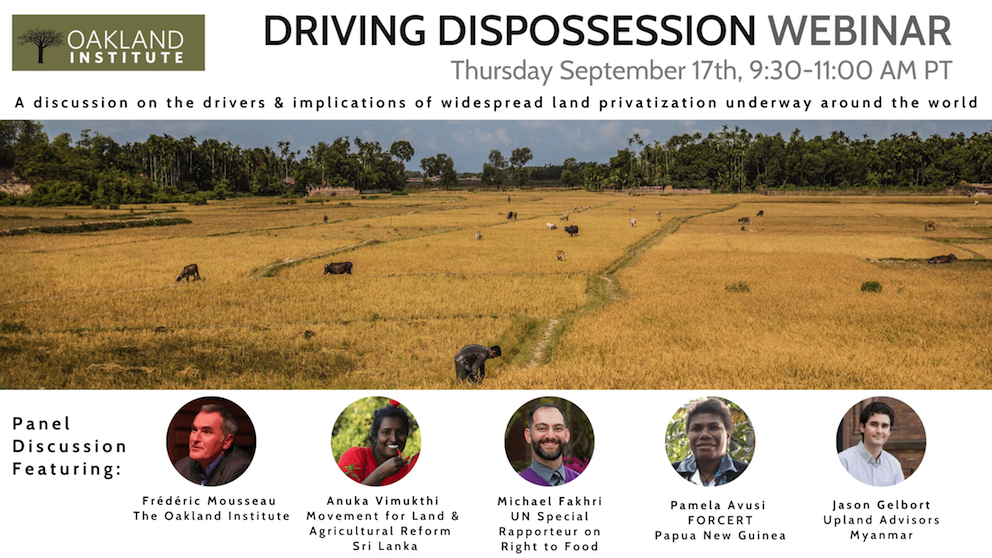WEBINAR: Driving dispossession - The global push to “unlock the economic potential of land”
This free webinar taking place on Thursday 17 September will bring together activists and experts from three case countries who will expose the drivers and impact of efforts to privatise land, explore their interconnected nature, and overview the change of course required for the people and the planet.
The webinar is based on a report released in July this year by the Oakland Institute, Driving Dispossession: The Global Push to “Unlock the Economic Potential of Land”, sounding the alarm on the unprecedented wave of land privatisation that is underway around the world. Through six case studies – Ukraine, Zambia, Myanmar, Papua New Guinea, Sri Lanka, and Brazil – the report details the myriad ways by which governments – willingly or under the pressure of financial institutions and Western donor agencies – are putting more land into so-called “productive use” in the name of development.
Registration is free but spaces are limited. Register here.
The event will also be live streamed from the Oakland Institute Facebook page and questions will be taken from the comments.
- When: Thursday, September 17, 9:30-11:00 Pacific Time (US and Canada)
- Where: Online webinar
- Cost: FREE (registration required, limited spaces available)
- More info: Visit the event page
Panelists
Frédéric Mousseau, Lead Report Author & Policy Director, The Oakland Institute
Michael Fakhri, United Nations Special Rapporteur on the Right to Food & Director of the Food Resiliency Project in the Environmental and Natural Resources Law Center University of Oregon.
Anuka Vimukthi, Movement for Land and Agricultural Reform (MONLAR) & Member of the International Coordination Committee of La Via Campesina, Sri Lanka
Jason Gelbort, Upland Advisors, Myanmar
Pamela Avusi, FORCERT, Papua New Guinea
Key report findings
- Hundreds of millions of hectares of land are being made available, including from some of the poorest countries, which raises serious concerns about this “development” strategy and the ability to eventually curb the over-exploitation of natural resources.
- While privatisation of land is being touted as a development imperative, Driving Dispossession debunks the myth that it leads to human development, and provides a strong rebuttal to the Peruvian economist Hernando de Soto’s pseudo-scientific thesis about the positive impact of titling, often cited to back such policies.
- Local communities, civil society organisations, and Indigenous People are standing up to resist these efforts to privatize their land to preserve their livelihoods and the environment.
- Sri Lanka: The Millennium Challenge Corporation, a US government entity, is targeting state land—it intends to map and record up to 67 percent of the country to “promote land transactions that could stimulate investment and increase its use as an economic asset.
- Ukraine: The World Bank and the International Monetary Fund leveraged the economic fallout from the COVID-19 pandemic to coerce “Europe’s breadbasket” into putting its agricultural land for sale in a land market.
- Myanmar: In 2018, the Vacant, Fallow, and Virgin Land Law was amended to boost economic development by making so-called “vacant” lands available for agriculture, mining, and other purposes.
- Papua New Guinea: Where 97 percent of the land is governed under customary tenure systems, the government wants to “unlock” this land so it can be “mobilized” and put in “productive use” to ensure “private sector growth.”
- Brazil: Bolsonaro has been aggressively expanding ranching and exploitation of the Amazon at the expense of the Indigenous People and the forests they live in and steward.
- Zambia: The World Bank has partnered with a subsidiary of the US-based online retailer Overstock.com to use blockchain technology for land titling with the goal of “unlocking trillions of dollars in global mineral reserves that are inaccessible due to unclear land governance systems.”
